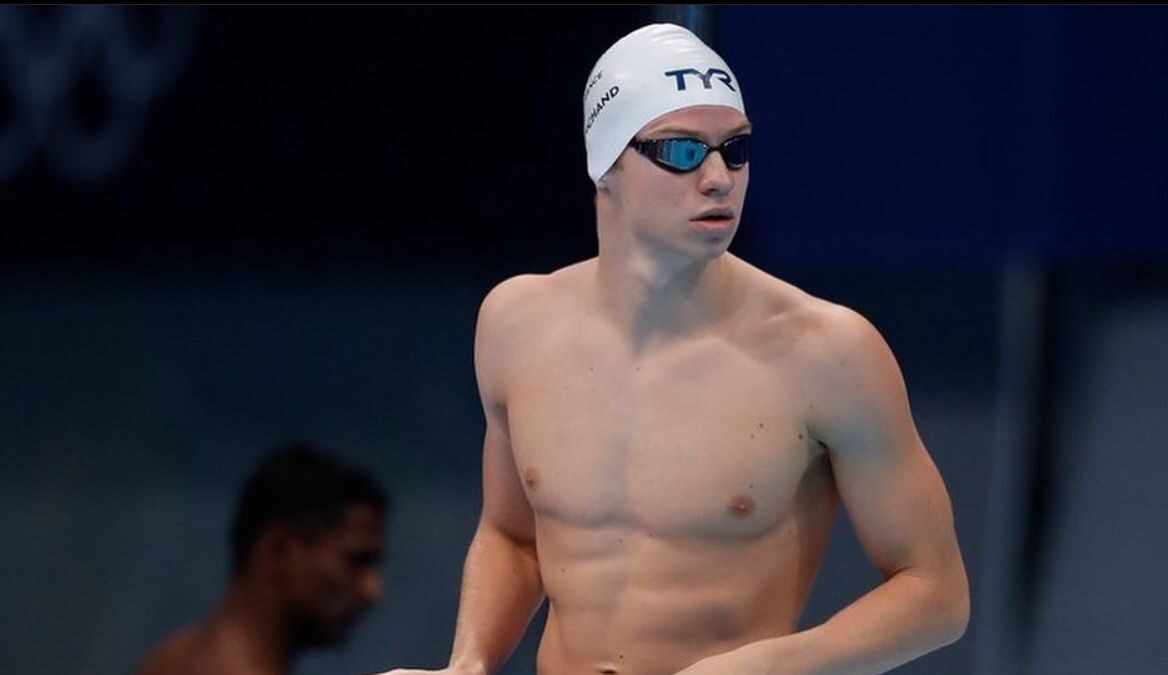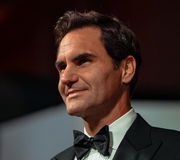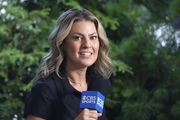

The 2024 Paris Olympics were an absolute whirlwind. France watched one of their own, Léon Marchand, triumphantly rise through the ranks at París La Défense Arena. During his first Olympic berth, the wunderkind couldn’t make it to the podium. But this time, the 22-year-old made heads turn in the swimming community by consistently shattering the glass ceiling in the pool. The swimmer walked away with four shiny gold medals and Olympic records in tow.
Watch What’s Trending Now!
But this brilliance couldn’t have come easy, could it? During a casual sit-down conversation with Clique TV, the Olympian revealed that he usually trains 35 hours weekly. However, this caught the host by surprise, who promptly asked if this affected the swimmer in any sense. “Yeah. Well, that’s a very good question because actually we don’t know, but in swimming, when we train, we can’t talk,” he stated.
Léon Marchand reiterates how he trains 2 hours twice a day. “Scoring is an individual sport, so it’s important to tell yourself that behind the cone, for example, in the final at the Olympic games, I’m all alone. There’s no one who’s going to help me. There’s no one who’s going to push me.” But with his coach, Bob Marchand, these 2 hours can get pretty intense. Even though schedule puts a damper on any socialization, it helped him dominate the Olympic pool at the French capital.
ADVERTISEMENT

ADVERTISEMENT
However, it isn’t as easy. “So, we barely have time to have a drink between the series, and it starts again.” However, when they do get the time to mingle, it often happens when they travel to training or meets. In fact, even though moving to the States was a massive culture shock for the 22-year-old, he found a silver lining amid the chaos. “In the U.S., I actually went to class with my friends who also swam. So, there was a bit more of this discussion and friends aspect,” he confessed.
The Olympian mentioned that he finally had the chance to be around them a lot more compared to when he was training. “So, I really learned all that there,” Marchand exclaimed. However, while this was worked on during training, it was harder than anticipated. But it didn’t compare to choosing to leave his home.
ADVERTISEMENT
Léon Marchand made a tough call to pursue his quest for greatness
The thunderous chants at París La Défense Arena got louder each time the 22-year-old’s head would pop out of the water. And the infectious energy got the best of his long-time coach, Bob Bowman. However, did you know that all it took was one cold email to bring this dynamic duo together? The Olympian had one goal—to become a swimming star. But this meant he would have to leave France and his family behind.
Léon Marchand had a tough choice to make. But his father, Xavier Marchand, encouraged him to take that giant leap of faith. This led to a long period of reaching out to various universities in the States. But this was right amid COVID-19, acting as another block in his path to success. That’s when the swimmer sent Bob Bowman the infamous cold email. During a time of uncertainty, the veteran coach helped him feel comfortable enough to navigate through the challenges.
ADVERTISEMENT

ADVERTISEMENT
But the Olympian had another reason to leave the next. Leading up to the pandemic, he confessed that burnout crept on him so quickly that it instantly took the joy and passion out of training. The constant need to achieve results further put a dent in how he felt about the sport. It almost made him fall out of love with swimming. But it turns out that this period was a blessing in disguise. Instead of letting the dissatisfaction consume him, he reached out to his family and worked on himself.
Top Stories
Greg Biffle’s $4M Worth Prized Possession Still Without a Buyer Leaves NASCAR Fans Heartbroken

LIV Golf Braces for Another Possible Exit in Wake of Brooks Koepka Departure

Sean Payton Announces Retirement Plans as Broncos HC Demands Improvement From Bo Nix & Co. Before Playoffs

Biff Poggi All But Confirms Bryce Underwood’s Michigan Future After Announcing His Own Departure

Roger Federer Draws Criticism from Swiss Government Chief for Tourism Boom in Country

Amanda Balionis Confirms New Relationship Ending Months of Rumors

“I became a human again. In fact, I was with my family,” Marchand admitted. Just when things felt bleak, he learned how to appreciate swimming again. By visiting places he loved and indulging in video games, the 22-year-old approached a mental coach to help build upon his mental resilience. Swimming can be physically demanding. But it can also create emotional challenges, especially in a high-intensity situation. Even though training to be the best of the best can be taxing, the Olympian seems to have found a way to even things out.
ADVERTISEMENT
ADVERTISEMENT
ADVERTISEMENT

